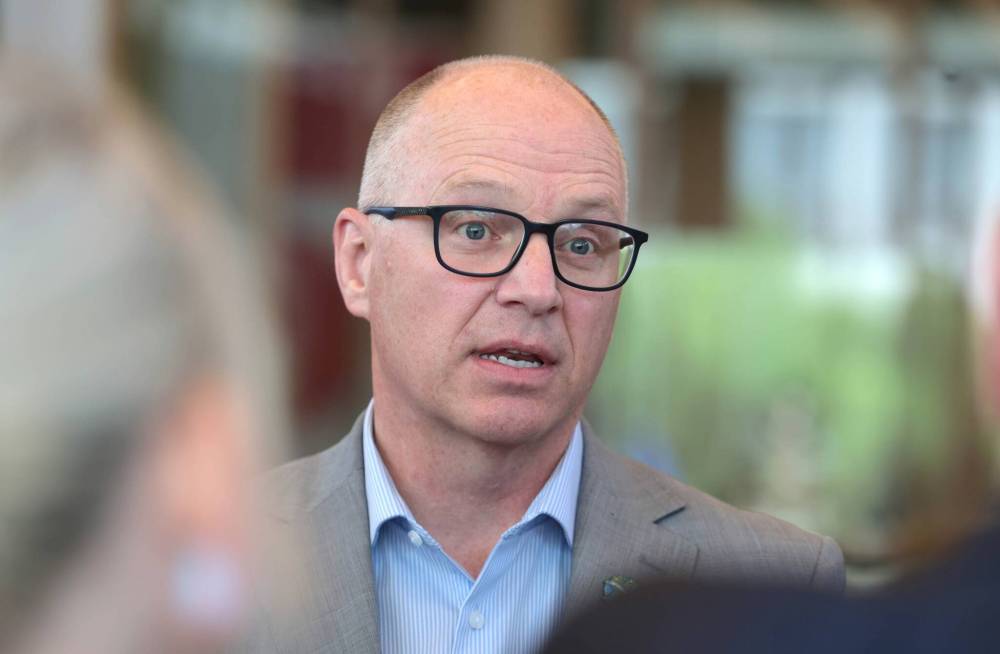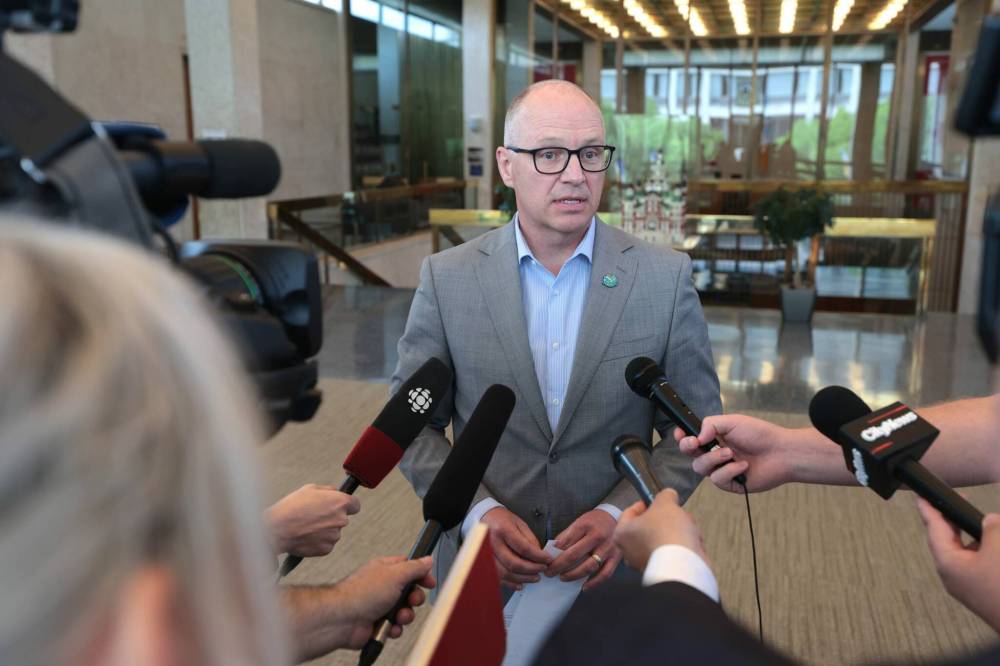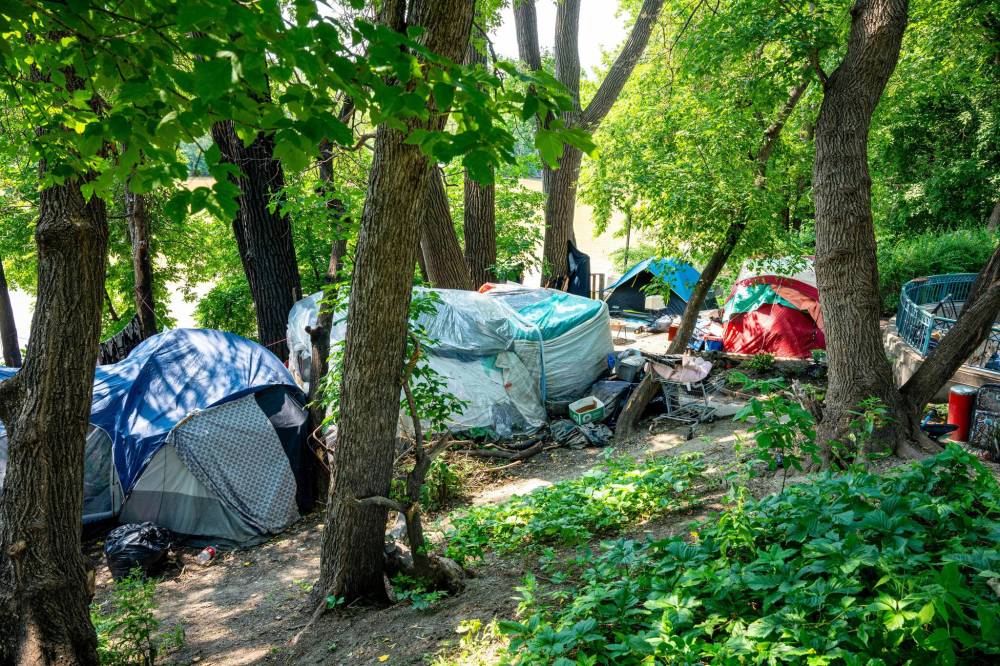Outreach workers who deal with the homeless population have been warned by Winnipeg’s mayor to stand back and let police, firefighters and paramedics do their jobs when there is criminal activity or a medical emergency at an encampment.
Mayor Scott Gillingham said Wednesday he had heard about instances in which emergency services personnel were hindered from fulfilling their duties because of interference from outreach workers. He felt compelled to write to the organizations to warn against the practice.
“I wanted, in no uncertain terms, everybody to understand that firefighters, paramedics, police, our emergency services personnel need to go where they’re needed, and without any interruption or any thought of interruption — just want to make sure everyone was clear on the same page,” the mayor told reporters at city hall.

Ruth Bonneville / Free Press
Winnipeg Mayor Scott Gillingham said he’d heard emergency services personnel had been hindered from fulfilling their duties because of interference from outreach workers.
The Free Press obtained a copy of the June 26 letter, which was sent to several service providers and copied to Premier Wab Kinew, several cabinet ministers and the chairman of the Winnipeg Police Board.
“There appears to be some confusion regarding protocols for addressing criminal activity or safety issues that may be taking place within encampments,” Gillingham wrote in the letter. “It is crucial (Winnipeg Police Service) and (Winnipeg Fire Paramedic Service) be allowed to do their work without interference.”
Gillingham told reporters he was left with an impression — after receiving feedback through “various sources and channels” – of “ambiguity in some quarters” about whether emergency services personnel should be allowed at encampments.
He said there has been resistance to police and fire-paramedic responders at camps, but didn’t provide details.
“I wanted to make sure in no uncertain terms that police do police work wherever there is police work that needs to be done, and fire and paramedics need to be able to go and do their work, no matter where the call,” the mayor said.
The letter, he said, was his chance to express “absolute support” for first responders and “make sure everyone was clear, on the same page.”
The mayor’s communications director, Colin Fast, said the letter was intended to serve as a reminder and clarify city policy.
“We’ve heard that there’s been some resistance to police being involved or attending the camps in certain cases,” Fast said by phone.
He was unable to provide examples, but said there have been instances of “groups kind of indicating to police that they’re unwelcome, or that they don’t think the police have a role to play.”

Ruth Bonneville / Free Press
Winnipeg Mayor Scott Gillingham said there has been resistance to police and fire-paramedic responders at camps, but didn’t provide details.
“I’m not saying that anything was done with ill will or bad intention; I think there was maybe just some confusion,” he said.
The bottom line for the mayor and city, Fast said, is that encampments should be safe for everybody.
Main Street Project executive director Jamil Mahmood was not made available to be interviewed by the Free Press, instead he issued a written statement.
It said MSP was one of 16 outreach service organizations or individuals that received the letter and the organization planned to seek clarity from the mayor about his assertions.
“We have received no communication previously about the issues in the letter, and no notice the letter was being supplied to media,” Mahmood said.
He said MSP hopes to meet with Gillingham “to address any confusion in a manner that is more productive and co-operative than responding via the media to a letter provided to them by the mayor’s office.”
He went on to say the organization continues to “be in constant communication” with emergency services on issues related to encampments.
He also said the organization will “continue to uphold our role and respect others’ roles in the city’s encampment support process map and the Kikinanaw Oma strategy, which outlines communications and response processes for encampments.”
Main Street Project is “alarmed” that some front-line staff received the letter directly, he said, adding it caused “concern and confusion among staff tasked to serve Winnipeg’s most marginalized.”

NIC ADAM / FREE PRESS FILES
Sixteen local outreach organizations received the letter warning them about interference at homeless encampments in Winnipeg.
End Homeless Winnipeg, another organization that received the letter, has requested a meeting with the mayor. The mayor’s office said no meeting date has yet been scheduled.
The group’s communications manager, Steph Bisson, said he doesn’t know what prompted the letter, and declined to comment further.
The issue is a new development in problems related to the community response to encampments. Recently, two non-profits that have different philosophical approaches clashed over a riverside homeless camp in south Winnipeg.
When St. Boniface Street Links went to the camp to try to help residents find housing, staffers from MSP showed up and told them it was their right to stay if they wanted.
City Coun. Janice Lukes told the Free Press at the time she was “frustrated” by the situation and said the groups were operating “under different philosophies and different approaches.”
jordan.snobelen@freepress.mb.ca
Jordan Snobelen
Reporter
Jordan Snobelen is a general assignment reporter for the Free Press. He spent four years reporting for community newspapers in Ontario before joining the Free Press’s city desk in 2024. Read more about Jordan.
Every piece of reporting Jordan produces is reviewed by an editing team before it is posted online or published in print — part of the Free Press‘s tradition, since 1872, of producing reliable independent journalism. Read more about Free Press’s history and mandate, and learn how our newsroom operates.
Our newsroom depends on a growing audience of readers to power our journalism. If you are not a paid reader, please consider becoming a subscriber.
Our newsroom depends on its audience of readers to power our journalism. Thank you for your support.